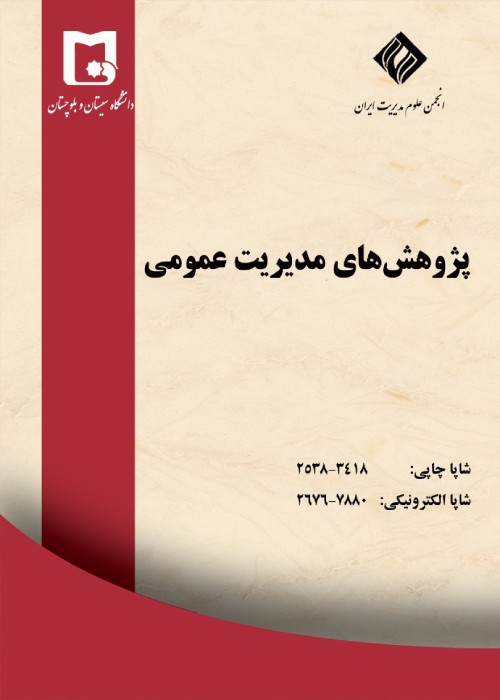Affecting Underlying Factors on University Virtual Education in Iran
Author(s):
Article Type:
Research/Original Article (دارای رتبه معتبر)
Abstract:
With the introduction of information and communication technology in the field of universities and educational centers and its integration with curricula, a new and important system of electronic education is formed and expanding that attracted the attention of many universities. Is. The main objective of this paper is to identify the factors that influence the virtual university education in Iran in order to provide a suitable model. Sampling was conducted purposefully using snowball method and 22 deep and qualitative interviews were conducted. Data analysis based on the data theory of the foundation, after encoding in three stages of open, pivotal and selective, illustrates 30 effective indications for the virtual university education model in Iran. These labels are identified in seven concepts that include: communication, trust building, knowledge localization, insight, human resource commitment, culture, technology, and leveling that can be used to design and develop virtual education centers as well as implement programs It will be effective.
Introduction
The most fundamental change that has taken place today in higher education in the world is that the definition of "higher education" has changed, since education, which is tasked with educating people only knowingly, is the higher education whose task it is to train entrepreneurship forces (Sediq, 2009). In order to improve the performance of the virtual university, we need a systematic management approach that, while coordinating and effectively communicating between elements and components of the virtual organization, can combine the activities of each component with the technological capabilities to increase learning. Therefore, the importance of paying attention to virtual education in order to develop the universities of the country with regard to native culture is obvious and its necessity in formulating content proportional to these values in the form of a comprehensive model of virtual education in Iranian universities and identifying Facilitating factors, this move is important. The main topic is not the necessity of virtual education in the country but the quality and quantity of these training, how it is organized and expanded, which has focused on many issues and has led to wider discussion and discussion. Case study Main aim of this study was identifying the factors of the underlying E-learning under a model in Iranian University. Present study was conducted in-depth interviews with experts in the subject area. Snowball sampling method and 22 qualitative interviews were conducted inorder to test findings of research.
The results of encryption in were analyzed in three ways: open, axial and selective. The findings indicate that 30 effective marks in virtual academic educational model and theses marks categorized in 7 concept which in cludes: Communication, building trust, indigenous knowledge, insight, commitment, human resources, culture, technology. Materials and Methods The research method was qualitative in this research. The first phase of the study was conducted as a library and described and analyzed research related to the model of virtual university education. In the second stage, semi-structured deep interviews with knowledgeable elites were used to find the factors and challenges of universities and virtual centers. Inorder to record the data from the interviews, the researcher, in addition to the outline note, proceeded to record the interview using tape recorder. In view of the theoretical foundations of qualitative research, simultaneous analysis and coding of interviews were carried out. Then, in order to diagnose, deliver and conclude the findings, they led to the identification of the final list of virtual education in Iranian universities.
Discussion and Results
According to the findings of the research, there are some executive strategies that can provide virtual education managers with a sense of successful implementation of this kind of training and its consequences. Conclusion This research uses theoretical foundations and a look at organizational concepts, management and leadership patterns in virtual organizations, with a qualitative approach and using the foundation data method to identify the underlying factors affecting the virtual university education model. By creating a new perspective based on the experts' opinions, they try to converge and concentrate these comments on the real conditions and requirements of the country, emphasizing the localization of this has been training and trying to maximize the speed with which this new training is to be completed. Considering the fact that the underlying conditions are factors that are effective in influencing the occurrence of the phenomenon, therefore, according to the findings of the study, communication, trust building, knowledge localization, insight, human resource commitment, culture, technology, and leveling were identified. The result is that if policy-makers and custodians of e-learning in formulating policies and programs for the creation or development of these centers pay enough attention to the levels and components mentioned, there is no doubt an effective step in the successful implementation of this Type of training in the country will be in line with international universities.Language:
English
Published:
Management Researches, Volume:11 Issue: 42, 2019
Pages:
229 to 246
magiran.com/p1967535
دانلود و مطالعه متن این مقاله با یکی از روشهای زیر امکان پذیر است:
اشتراک شخصی
با عضویت و پرداخت آنلاین حق اشتراک یکساله به مبلغ 1,390,000ريال میتوانید 70 عنوان مطلب دانلود کنید!
اشتراک سازمانی
به کتابخانه دانشگاه یا محل کار خود پیشنهاد کنید تا اشتراک سازمانی این پایگاه را برای دسترسی نامحدود همه کاربران به متن مطالب تهیه نمایند!
توجه!
- حق عضویت دریافتی صرف حمایت از نشریات عضو و نگهداری، تکمیل و توسعه مگیران میشود.
- پرداخت حق اشتراک و دانلود مقالات اجازه بازنشر آن در سایر رسانههای چاپی و دیجیتال را به کاربر نمیدهد.
In order to view content subscription is required
Personal subscription
Subscribe magiran.com for 70 € euros via PayPal and download 70 articles during a year.
Organization subscription
Please contact us to subscribe your university or library for unlimited access!


